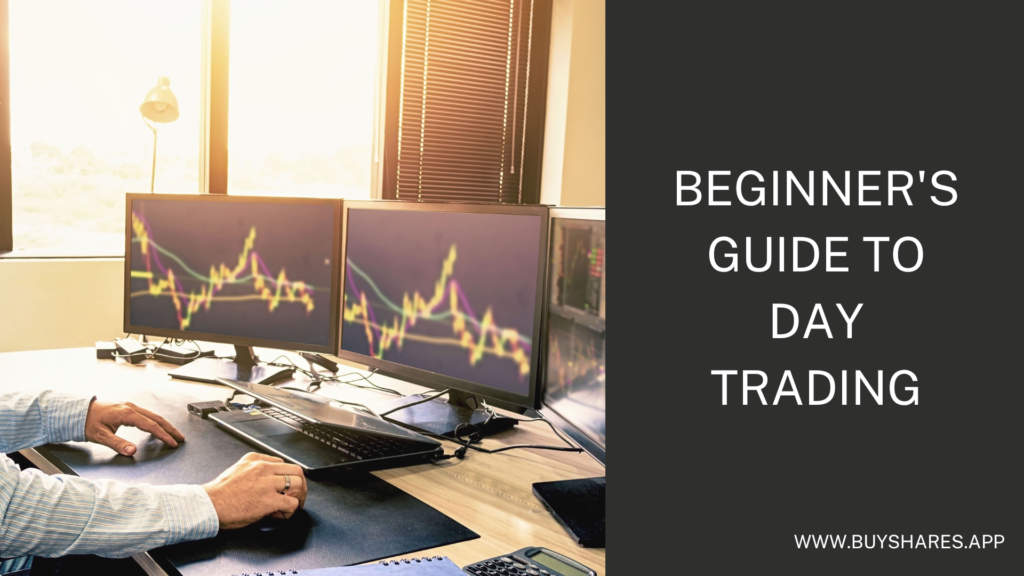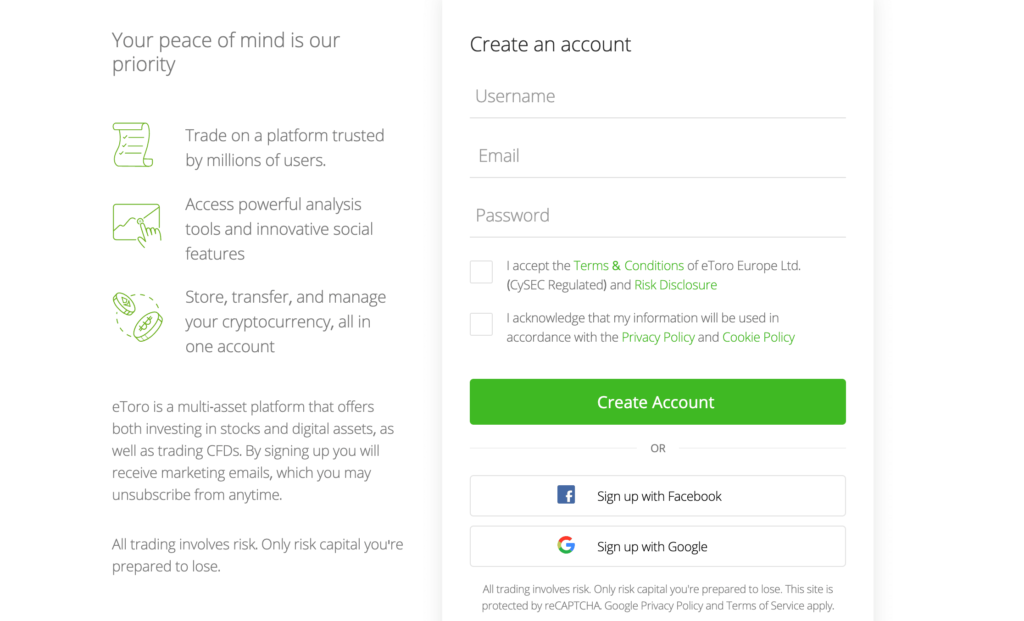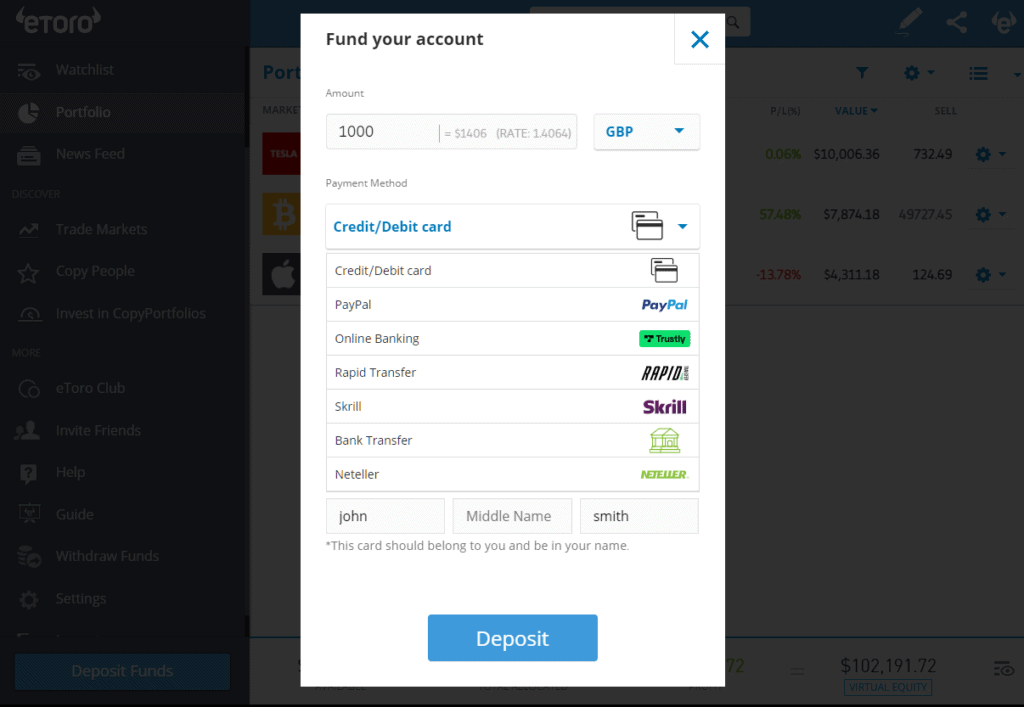Among short-term investments, day trading is well-liked. Thanks to technology like mobile apps, this strategy has grown in popularity for trading while stationary or at home. Despite how simple it seems, day trading is not suitable for everyone. To make it work for you, you’ll need a level mind, alertness, persistent attention, a solid grasp of trading tactics, and substantial knowledge of how and why stocks move.
This comprehensive guide to day trading for beginners explains the strategy’s components and how it operates. It also includes concrete examples of trade placement and an analysis of the data that day traders utilize.

What is day trading?
Day trading, as the name implies, is a short-term strategy that entails buying and selling financial assets and closing off positions by the end of the day in order to profit from minute price changes. Trading with such a limited time frame enables traders to benefit from minute price changes while safeguarding themselves against uncontrollable risks and negative price gaps that could emerge over the course of the overnight period between trading sessions.
This strategy has risen in popularity in recent years in the UK. Fast broadband and mobile connections have made it possible for us to access a multitude of real-time market data, which has greatly contributed to this development. Due to this, a lot more people are now accessing the markets and making trades throughout the day in an effort to profit from market volatility as prices rise and fall.
How does day trading work?
When you day trade, a single day is the length of each trading period. You begin buying at the beginning of the day, finish at the end of the day, and then start over the next day. The goal is to profit from minute changes in the market by purchasing and selling a number of assets on the same day, often more than once per asset. Although the earnings you can make per trade will be modest, in theory they should accumulate over a number of trades.
Investable Instruments for Day Traders
You might have access to hundreds of marketplaces around the world as a trader who engages in day trading from the UK. Your broker will determine the exact number of markets you can trade on, but in most cases, you’ll be able to do so on the following ones:
Stocks

Stocks signify ownership in a publicly traded corporation, such as General Motors, Tesla, Facebook, or Amazon, to mention a few. Similar to other markets, the dynamics of supply and demand affect how much stocks cost.
The price of the company’s stock will most likely grow when markets are confident in a company’s and its products’ prospects when a company reports earnings that are greater than anticipated or gains market share.
Those reports and significant technical levels will be followed by a stock trader who engages in day trading in order to acquire stocks at a cheaper price and sell them later at a higher price. In a similar vein, shorting a stock allows a trader to profit from declining prices.
Also read: Stock Trading in the UK- Beginner Guide
Commodities

Commodities that are traded on financial markets around the world, mostly the futures market, are included in the commodities market.
Trades can also be made on CFDs that follow the price of commodities, though. Oil, wheat, gold, silver, natural gas, cocoa, and copper are a few examples of popular commodities for trade.
Also read: Commodity Trading UK- Beginner’s Guide 2022
Cryptocurrencies

A growing number of brokers are now including those fascinating new digital currencies to their list of tradeable assets as a result of the popularity of cryptocurrencies like bitcoin, ripple, Ethereum, and others.
But keep in mind that cryptocurrencies can exhibit considerable volatility, making trading them on the Forex market riskier than trading normal currencies.
Also read: Cryptocurrency Trading UK – Beginner’s Guide 2022
Forex

In terms of daily trading volume, the foreign currency market dominates all other financial markets worldwide.
On the forex market, hundreds of billions of dollars worth of currencies are traded every day, with the US dollar, euro, British pound, Canadian dollar, Swiss franc, Japanese yen, Australian dollar, and New Zealand dollar is the most liquid ones.
Because currencies are traded in pairs, you are constantly simultaneously purchasing one currency and selling another. When you purchase the EUR/USD pair, for instance, you are actually purchasing the euro for US dollars, which implies that you will earn if the value of the euro increases relative to the US dollar. In contrast, if you sell euros for US dollars and short the EUR/USD pair, you will win if the value of the euro declines relative to the US dollar.
Interest rates, inflation rates, economic development, productivity growth, market positioning, risk sentiment, and other variables all have an impact on currency exchange rates.
Given the forex market’s liquidity and the ability to trade currencies around the clock, many traders opt to start day trading on the currency market. I advise you to study our Forex beginner’s guide to familiarise yourself with the ins and outs of this dynamic market.
Also read: How to Trade Forex UK
Derivative contracts
Derivative financial contracts derive their worth from an underlying investment. Options and futures contracts are two common derivatives. However, trading derivatives are typically more difficult and should only be done by traders with more expertise.
Choose a broker that offers all the marketplaces you want to trade on if you’re just starting off with day trading. For example, some Forex firms don’t sell cryptocurrencies, while others don’t let trading on stocks. Making the best broker choice now is simpler than changing brokers later.
How to Make Money from Day Trading?
The market day trader needs a plan in order to be successful. Before we look at some of the most popular day trade stocks, here is a primer on what you need to day trade successfully.
Utilize a stock broker with no commissions
Being able to consistently profit from short-term price changes inside a single trading day is the key to day trading. Your profits should not be reduced by trading commissions at all costs.
Concentrate on the selection of stocks
Every stock has a distinct personality and behaves in a specific manner. What you are most familiar with is the stock that day traders most frequently trade. Stick to a few stocks and trade them daily when you initially start day trading. This will help you understand how that stock moves and increase the likelihood that patterns will emerge that you can trade off of.
Get familiar with technical analysis
The majority of day traders heavily rely on technical analysis when determining where to find equities for day trade. The art of analyzing price and chart trends is this. Technical analysis-related information is widely available online.
Trade with a strategy
It’s crucial to have a day trading plan. After all, trading short-term price changes necessitates that you evaluate all the information at your disposal and decide where you believe the market will go next.
To get in at the best price, your capacity for processing this information is crucial. A plan can act as a checklist that will enable you to quickly and objectively analyze the information you need.
Use risk management techniques as well. Reduce your trading volume to prevent your account from being wiped out if a few deals go against you.
Day Trading Strategies
In order to succeed in the world of day trading, one must have a trading strategy. The issue is the vast number of available strategies. When you initially start day trading, you might trade all of them at first before concentrating on one or two that really suits your personality type and work for you.
Scalping
Selling almost immediately after a trade turns lucrative is one of the most well-liked day trading methods. It emphasizes tiny, regular earnings. It may not yield the highest returns conceivable, but Scalping reduces the likelihood that one would miss the peak and lose money.
Trend trading
With this strategy, you examine whether asset values are rising or declining and purchase or sell according to which way the trend is moving. When prices are obviously rising, you should buy, and when prices are falling steadily over time, you should sell. Even if they think an asset will continue to rise or fall, day traders will close out at the conclusion of the day. However, this tactic is not only used by day traders.
Swing trading
In this type of trading, your goal is to profit from an asset’s daily volatility. Predicting the day’s lowest low and highest high is the goal in order to buy (or sell) at the first indication of a reversal.
Mean reversion
According to this notion, prices will eventually revert to their historical average. It searches for assets that are performing differently from their historical average using technical analysis in order to profit from the restoration of normalcy.
Money moves
This evaluates whether an investment may be overvalued or oversold using a combination of volume and price by comparing the amount of trades from the prior day to the existing day. When assets are overbought, money flow traders sell, and when they are oversold, they buy.
Is Day Trading Safe?
Only the appropriate broker can make day trading risk-free. After all, your broker is the one who manages your money and places your trades. Utilizing a highly regulated broker who is open and honest in its dealings is crucial.
For instance, day trading with eToro is thought to be safe. This is due to the fact that eToro is authorized and governed by the Cyprus Securities and Exchange Commission, the Australian Securities and Investments Commission, and the UK Financial Conduct Authority (FCA) (CySEC).
In addition to being governed everywhere in the world, it is also registered with FinCEN, a participant in FINRA, and a member of SIPC, all of which are US-based rules. When your broker permits you to employ stop loss and take profit orders, as eToro does, day trading is also significantly safer.
Best Day Trading Platforms
It’s crucial to choose the correct broker for day trading. Everything, including the commissions you pay, the assets you can trade, and the day trading platforms you can use, is within your broker’s control.
1. eToro

The most well-known day trading site in the UK is eToro, which allows for trading in stocks, ETFs, bonds, FX, commodities, and cryptocurrencies. All stock trades with this day trading UK broker are completely commission-free. Additionally, you can trade equities with a 5:1 leverage ratio and currency with a 30:1 leverage ratio.
The fact that eToro includes a social trading network is one of its cool features. You can start a conversation about day trading tactics or connect with other traders to exchange ideas. You can automate your portfolio management with eToro thanks to its copy trading functionality.
For day trading, eToro’s trading platform is quite reliable. The charting interface has approximately 100 studies, however, you cannot design your own indicators. A useful mobile trading app and news feed are also provided by eToro.
2. Plus500

Another commission-free CFD broker is Plus500. Along with trading currency, cryptocurrencies, and commodities, you can trade hundreds of global shares. With some of the lowest trading spreads we’ve ever seen, Plus500 is especially economical for day trading.
It is simple to use and has more than 90 technical indicators on this day trading platform from the UK. Countless drawing tools are also available to you. Please take note that this site does not allow you to generate your own studies or forex signals.
The fact that Plus500 provides advanced price notifications is one of the features we like the most. Any asset can have triggers set up, and when the target price is reached, a notification will be sent to your smartphone. Because of this, keeping up with the market is simple even when you’re not using your computer.
How to begin day trading?
It is simple to start day trading; to do so, a trader only needs to open an account with any online broker. The process for beginning same-day trading with the suggested eToro broker is outlined in the steps that follow.
Step 1: Create an account
After choosing an online broker, you must go to the site to create an account. The eToro registration process doesn’t take long at all. When creating an account, you are required to enter your email address and a strong password. Your personal information, including your name, address, and contact number, must be provided.

You must validate the required documents when the account is created. Once you are on the eToro site, verify your account by submitting the required documentation. Then, click “Full Profile” to finish filling up your profile. You can complete your profile and validate your account in this manner to enable all of the broker’s services.
Step 2: Add money to your account
To deposit the money into your account, select the “Deposit” button. Consequently, you can fund your eToro account however you like. eToro charges no deposit fees and other costs. It accepts payments made with credit cards, debit cards, wire transfers, e-wallets, PayPal, and bank transfers.

Step 3: Acknowledge the day trading features
There are several features in the eToro Marketplace. With eToro, the top social media and copy the trading site in the world, you can access and share a wealth of knowledge on a variety of financial assets. The option to directly copy the portfolios of other successful traders is also available.
Step 4: Use eToro ProCharts
Use eToro’s ProCharts option to have access to cutting-edge charting and trading tools. You can then use the numerous trading indicators and sketching tools that aren’t accessible on the underlying platform.
Step 5: Start day trading
When a trading signal appears, you can open a position because day trading involves numerous trades on the same day. To view the work performance, click “Portfolio” after that. To close the position, click “Close.”
Pros and Cons of day trading
Consider the pros and cons stated below when deciding if intraday trading is good for you.
Pros
- With day trading, you can earn very significant profits if you’re ready to assume the dangers.
- With day trading, you can have your daily results quite rapidly.
- Your gains could quadruple if you trade intraday.
- Day trading has a lot of liquidity.
- It provides access to more commercial prospects and tactics.
- You can avoid paying broker fees each night by doing this.
- By doing this, you can avoid price changes that might occur overnight.
Cons
- It has a high-risk factor.
- Day trading involves high taxes, which might reduce your income.
- You must have enough capital to lose if the trade doesn’t turn out as you expected in order to begin trading that day.
- Day trading is difficult to learn. For day trading to be effective, there must be a significant learning curve, expertise, and a strong approach.
Conclusion
What it takes to become a day trader in the UK is something we’ve attempted to address in this article. With nearly twice as many day traders as Germany, which came in second, the UK has the most day traders in all of Europe.
Day trading can be thrilling and profitable, but only if you do the fundamentals correctly. Taking deals during a single trading day is known as day trading. Day traders minimize overnight risks by opening and closing their trades on the same day.
To start a day trading business, you don’t need a lot of capital. These days, the majority of brokers don’t require a minimum deposit, so you can start trading with any amount you can afford to lose. When you start to consistently turn a profit, try to progressively increase your account and think about adding regular contributions to it.
Frequently Asked Questions
How can I benefit from day trading stocks?
By concentrating on a core group of methods like trend trading, countertrend trading, reversion to the mean trading, gap trading, and news trading strategies, you may day trade stocks and turn a profit.
How can a novice day trader get started?
For novice day traders, a broker account and charting software are required. Focus on the stocks you are familiar with that have high liquidity to locate the most well-liked equities for day trading as a beginner.
What risks do day traders face?
Day trading requires a specialized skill set because you will be making many trades quickly. Risk management is crucial as a result. Reduce your risk to prolong your participation in the game.
Which taxes are paid by day traders?
Distinct nations have different tax regulations. Day traders may be subject to income taxation in some nations and capital gains taxation in others. As an alternative, some day traders might run their businesses under a limited company and declare their profits as turnover.
